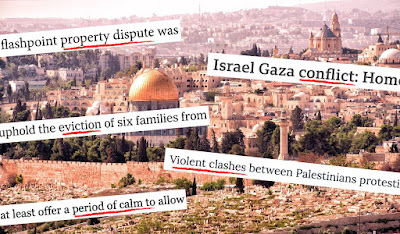Finding truth and holding the powerful to account are core principles of journalism.Yet for decades, our news industry has abandoned those values in coverage of Israel and Palestine. We have failed our audiences with a narrative that obscures the most fundamental aspects of the story: Israel’s military occupation and its system of apartheid.
For the sake of our readers and viewers — and the truth — we have a duty to change course immediately and end this decades-long journalistic malpractice.
Take, for example, the language used in the recent coverage of East Jerusalem neighborhood Sheikh Jarrah. Media outlets often refer to forced displacement of Palestinians living there — illegal under international law and potentially a war crime — as “evictions.”This term misleadingly implies a real estate “dispute” between tenant and landlord, an inaccurate depiction of the state of affairs. The United Nations considers East Jerusalem occupied Palestinian territory, meaning Israel’s territorial claims there are not recognized.
Let's pretend that part of Jerusalem is occupied. Does that mean that the legal owners of a property cannot demand rent? These so-called journalists pretend that the Sheikh Jarrah events are Israel trying to evict Arabs from their homes, but the government of Israel has nothing to do with it. It really is a real estate dispute - one where one side has shown, over decades, that it is the legitimate owner of the land, and the other side has failed to do so.
That's the truth that these journalists want to hide from you.
During the last few days of Ramadan, Israeli forces violently attacked worshippers at the Al Aqsa mosque compound with tear gas and rubber-tipped bullets. Journalists didn’t call this an “attack” or “assault” on Palestinians, but rather a “clash,” as if both sides shared equal culpability and agency in the escalation.
On 7 May, large numbers of police were deployed on the Temple Mount as around 70,000 worshippers attended the final Friday prayers of Ramadan at al-Aqsa. After the evening prayers, some Palestinian worshippers began throwing previously stockpiled rocks and other objects at Israeli police officers. Police officers fired stun grenades into the mosque compound.
When Israel attacked Gaza, media outlets framed it as a “conflict” between two equal entities, ignoring the total asymmetry in power. Under the guise of objectivity, rockets fired at Israel — which caused significantly less damage than Israeli airstrikes — were covered just as much as Israel attacking medical facilities and leveling entire residential buildings, clouding the nearly one-sided scale of violence and destruction.
The human toll caused by Israel’s bombardment is indisputable: Hundreds dead, more than 65 of them children. While statements made by Israeli officials and their defenders justifying the killing of civilians went unchallenged, Palestinian civilians had their humanity interrogated: Journalists asked whether they support violence or Hamas rockets.
Young women in Gaza tell me how it feels to live in an open air prison, that they too want to live in peace, and see the rockets as “self defence.” pic.twitter.com/SLHvkcTVx3
— Richard Engel (@RichardEngel) May 25, 2021
Troubling still, reporting wanes considerably when Israel halts its airstrikes. Palestinians are ignored in so-called times of “peace” despite attacks and other hostile aspects of life under occupation continuing after the ceasefire.
As journalists, we are entrusted with a profoundly important mission in a free and democratic society, the power to inform the people and guide the national conversation, from the family dinner table to Capitol Hill.We are calling on journalists to tell the full, contextualized truth without fear or favor, to recognize that obfuscating Israel’s oppression of Palestinians fails this industry’s own objectivity standards.We have an obligation — a sacred one — to get the story right. Every time we fail to report the truth, we fail our audiences, our purpose and, ultimately, the Palestinian people.

 Elder of Ziyon
Elder of Ziyon























